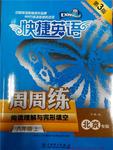题目内容
Since 1999, the number of foreign students at German universities ______ from 113,000 to almost 200,000
A. has increased B. have increased
C. are increased D. was increased
A

 快捷英语周周练系列答案
快捷英语周周练系列答案The possibility that pleasant smells might reduce pain has recently been suggested by new research. In a scientific study, doctors asked 20 men and 20 women to keep their hands in very hot water for as long as possible while breathing in different smells.
As people believe that strong smells can affect the senses, volunteers were asked not to eat or drink for eight hours before the experiment began. During the experiment, volunteers were asked to take in pleasant smells such as vanilla (香草), and unpleasant smells such as durians (榴莲). The volunteers kept their hands in the water until it became too hot for them. When they could not bear the pain any more, they took their hands out of the water.
Scientists are interested in whether the senses or smell is related to pain and whether men and women have the same senses. Now, the study has proved that for women, pleasant smells reduce pain. For men, there is no change.
Dr Finkelstein has been studying smells since 1999. He says that scientists already have data from 40 volunteers. He adds that this year, scientists will test another 60 volunteers and will be in a better position to explain the results.
One explanation is that women’s sense of smell developed long ago, and is linked to recognizing the smell of babies. Scientists used to believe that mothers recognized their children by sight only. Now, they have started to believe that the sense of smell also helps, but why pleasant smells do not reduce pain in men is a question still to be answered by scientists.
【小题1】Before the experiment, volunteers ______.
| A.are gathered and take a training |
| B.cannot eat or drink for several hours |
| C.must wash their hands carefully |
| D.will be interviewed by Dr Finkelstein |
| A.women may stand the pain of the hot water longer |
| B.men may keep their hands in the hot water longer |
| C.they will probably take their hands out at the same time |
| D.we are not quite sure who will take their hands out earlier |
| A.the reason why women are sensitive to smells is clear |
| B.the experiment for the sense of smell has come to an end |
| C.unpleasant smells affect men’s senses more than women’s |
| D.scientists have not totally explained the result of the study |
| A.mothers recognize their children only by sight |
| B.men’s sense of smell developed a long time ago |
| C.strong smells have a great influence on people’s senses |
| D.smells are helpful for mothers to spot their children |
| A.supply some entertainment to us |
| B.show women’s sharper senses than men’s |
| C.inform the readers of some knowledge |
| D.call for volunteers for the experiment |